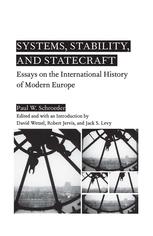

Most ebook files are in PDF format, so you can easily read them using various software such as Foxit Reader or directly on the Google Chrome browser.
Some ebook files are released by publishers in other formats such as .awz, .mobi, .epub, .fb2, etc. You may need to install specific software to read these formats on mobile/PC, such as Calibre.
Please read the tutorial at this link: https://ebookbell.com/faq
We offer FREE conversion to the popular formats you request; however, this may take some time. Therefore, right after payment, please email us, and we will try to provide the service as quickly as possible.
For some exceptional file formats or broken links (if any), please refrain from opening any disputes. Instead, email us first, and we will try to assist within a maximum of 6 hours.
EbookBell Team

5.0
58 reviewsFew scholars have provided as much insight into the struggle of leaders, ideas, and policies as Paul W. Schroeder. Constantly challenging conventional views, and drawing upon a masterly command of the sources and literature, Schroeder provides new answers to old questions about international history and politics since the age of Napoleon. Were European international relations really driven by balance of power politics, or has that traditional view blinded us to an underlying normative consensus on the 'rules of the game' that frequently contributed to cooperation among the leading states in the system? Are alliances primarily a means of the aggregation of power against stronger states, or do states often use alliances as instruments of influence or control over their allies? Was World War I contingent upon a confluence of independent processes that intersected in 1914, or was it the product of more deeply-rooted and interconnected structural forces that pushed inevitably toward war? What is the role of moral judgment in historical investigation? Raising new questions and offering provocative new interpretations, Schroeder encourages historians and political scientists alike to reconsider their long-standing beliefs about the evolution and dynamics of modern diplomacy.